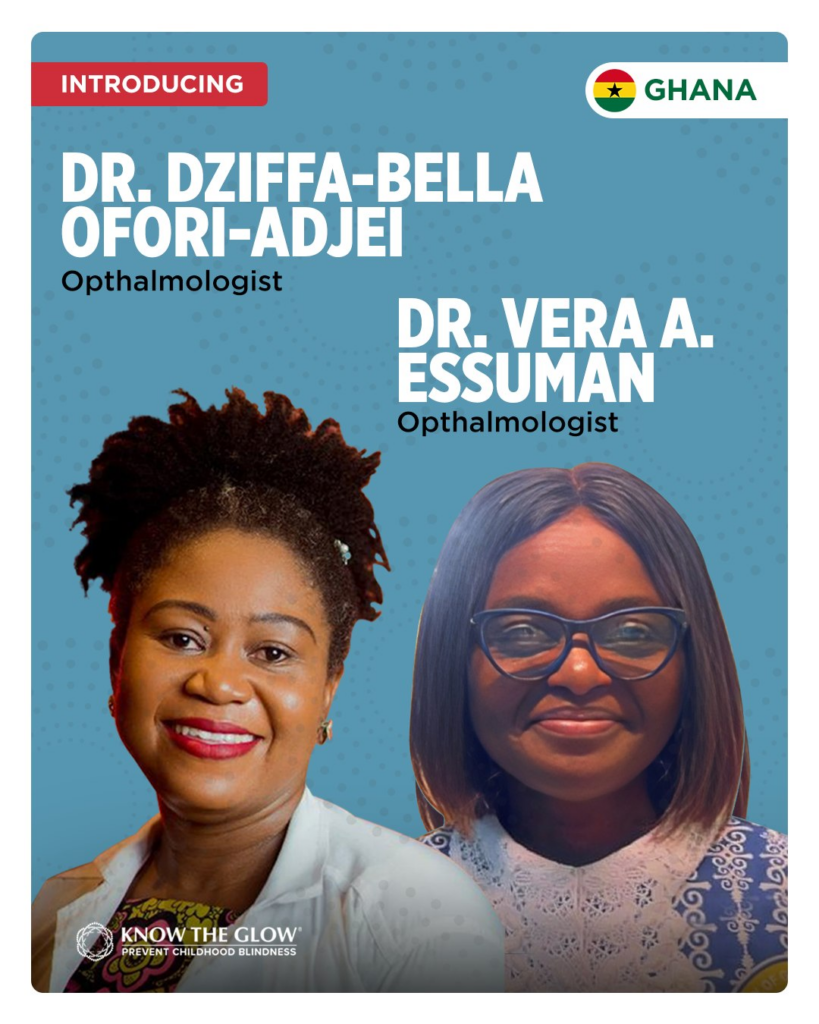In a recent interview, Megan Webber and Helene Dameris of KnowTheGlow reconnected with Prof. Vera Adobea Essuman and Dr. Dziffa-Bella Ofori-Adjei, two dedicated ophthalmologists from Ghana. Megan first met Prof. Essuman at the ISOO conference in Kenya last year and was profoundly inspired by her commitment and extensive work in Ghana. This interview was an opportunity to explore future awareness campaigns in Ghana and discuss the current challenges and achievements in pediatric eye cancer treatment in the country.
Prof. Vera A. Essuman, who has played a lead role in establishing an Intra-Arterial Chemotherapy (IAC) service in Ghana, emphasized that leukocoria is the defining symptom in more than 70% of Retinoblastoma (RB) cases. Dr. Ofori-Adjei, a Pediatric Ophthalmologist at Korle-Bu Teaching Hospital and President of the Ophthalmologist Society of Ghana, has collaborated extensively with Prof. Essuman in these efforts. They have trained frontline healthcare workers using the Arclight device, with support from the Alliance Mondiale Contre le Cancer (AMCC), Rotary Club, and Worldwide Child Cancer Fund.
Prof. Essuman outlined her five-year goal to increase the survival rate of her young patients. She recently held a stakeholder meeting with representatives from the Ministry of Health, other stakeholders from the health workforce, local and international experts to draft a strategy for improving RB care. The plan, which aims to meet global standards, is expected to be adopted by the Ministry of Health in 2025. Despite not being officially implemented yet, many objectives are gradually being put into practice. Currently, advanced treatments like IAC are paid out of pocket and reserved for moderately severe cases not amenable to focal treatment but offer the potential to salvage both globe and vision, due to the high cost of $5,000 per session (discounted), which is not covered by national health insurance. They are also working on introducing brachytherapy to ensure all forms of treatment are available locally, thus eliminating the need for patients to travel abroad.
A recent national survey revealed a disheartening 20% survival rate for children with RB in Ghana, with 56% of patients abandoning treatment. This stark reality highlighted the urgent need for improved awareness and early detection. Dr. Ofori-Adjei was particularly dismayed by these findings, after initially believing the survival rate was closer to 50%. Both doctors are eager to partner with KnowTheGlow and other international organizations to boost awareness and improve early detection rates, which are crucial for saving lives.
Prof. Essuman explained the different levels of care in Ghana, emphasizing the importance of primary care in creating awareness and streamlining referral pathways. Access to treatment remains a significant challenge, with children often traveling more than 80 km for care. The baseline national survey they conducted will help track progress and adjust objectives over time.
Megan inquired about parent support networks. Dr. Ofori-Adjei mentioned that there is a national parent support group for all childhood cancers,the Ghana Parents Association for Childhood Cancer (GHAPACC), which is instrumental in advocacy and peer counseling. This GHAPACC worked with the pediatric oncology team and other stakeholders to get four childhood cancers covered by national health insurance, including RB.
They also discussed a neonatal case that required treatment in South Africa and a subsequent recurrence years later, illustrating the complexity and long-term nature of RB care. Despite the challenges, Prof. Essuman credits the One RB conference in Washington DC in 2017 as being a turning point for embarking on the establishment of a comprehensive national strategy for retinoblastoma in Ghana, bringing together an international community ready to support Ghana’s efforts in improving the survival of children with retinoblastoma
Looking ahead, there are plans for a dedicated awareness campaign in Ghana next year, following the success of a similar campaign in Kenya. The campaign will aim to increase early detection rates and improve treatment accessibility. KnowTheGlow aims to be additive to all their awareness, prevention, and screening efforts in whatever way possible and looks forward to highlighting their success!
By 2030, Prof. Essuman and Dr. Ofori-Adjei hope to work with other stakeholders to increase the RB survival rate in Ghana to at least 60%, concluding their meeting with a strong message of hope and determination. Both doctors are committed to working tirelessly to improve pediatric cancer care in Ghana. Their collaboration with KnowTheGlow and other international partners is a significant step towards achieving their ambitious goals. Megan and Helene’s enthusiasm and support for their efforts underscore the global commitment to combating childhood cancer and improving outcomes for all children, in every nation, worldwide.

